Emotional Intelligence and Social Responsibility

Empathy and social responsibility skills are part of a balanced package that’s increasingly being recognised as desirable in today’s business climate. As an example, many organisations are investing in social enterprises. Governments often mandate for large contracts they include products that are sourced from socially responsible organisations. So, what does that mean for us as individuals and how social responsibility relates to our emotional intelligence capability?
Social Responsibility Defined
This subscale is a component of the Interpersonal Composite reviewing how we are in relationship to others beyond our inner network and looking to the broader community and the society in which we live. Another name for Social Responsibility is “ethical competence” and most often referred to in the workplace as having integrity.
Social responsibility comprises the desire and ability to willingly contribute to society, your social groups, and generally to the welfare of others. This component of emotional intelligence involves acting in a responsible manner, even though you might not benefit personally, doing things for and with others, accepting others, acting in accordance with your conscience, and upholding social rules. Socially responsible people have social consciousness and a basic concern for others, which is manifested by being able to take on community-oriented responsibilities.
Being socially responsible can be considered within the context of organisations such as having loyalty toward people and the goals of your organisation, cooperating with others, creating an inclusive environment and having responsibility for both the success and failure of the organisation.
How Social Responsibility balances with other Emotional Intelligence capabilities
- Self-Actualisation - Self-Actualisation is one’s effort and action to set and achieve goals for continued growth and development. When we are active in the pursuit of personal and professional improvement it can foster the desire to think about our impact and contribution to broader society. Realising our potential helps us see that we can make a difference to improving ourselves, our lives, our organisation and the world around us.
- Independence - Our ability to be self-reliant and not overly influenced by those around us provides us with the strength to stand up for what we believe in, or what might be of benefit for the group. Within an organisation context, ensuring that all voices are heard, and everyone can contribute to decisions can come down to the capability of the leader to demonstrate both their independence and their social responsibility, so their moral compass is pointed in the right direction.
- Empathy - To have empathy is to understand the feelings and perspectives of others in their circumstance. Being able to emotionally connect or care for others and their challenges is foundational to the attribute of Social Responsibility. As an example, moving outside of your own map of the world to understand the perspective of others enables you to make decisions that benefit the wider group. This plays a part in an organisation’s ability to hear diverse views and be inclusive in decision making.
Five Key Signs to Cultivate More Social Responsibility
We all have room for improvement. Here are some key signs that can tell us we might need to work on our Social Responsibility.
The Nuances of Ethics and Consideration
The nuance of ethics and consideration referred to here are not just on the macrocosm of doing right or wrong according to law or policy, but the little nuances in everyday work situations that we might at times become a little too relaxed with or might overlook.
Examples of these could include keeping confidentiality of clients and team members, honesty about a project’s progress, ensuring fair distribution of tasks and opportunities in team collaborations to ensure discrimination or biases aren’t influencing choices, and ensuring bullying or sabotaging at any level isn’t occurring.
Big issues can start as small ones. By ensuring a high level of consistency in what we hold ourselves accountable to, and those around us, we can eliminate the chance of issues snowballing and leading to, at worst case, a hostile or psychologically unsafe environment.
Collective Wins and Personal Ambition
In an individualistic culture where our focus is on personal achievement it is easy to get caught up in our ambitions. The risk we have is that we can at times overlook, due to unconscious bias, opportunities to see beyond the scope of our ambition and direct efforts toward a more holistic win.
If we have become too vigilant in the pursuit of our dreams, it might be time to take a breather and look up to see where we might be able to contribute to the collective win.
By keeping our eyes and ears peeled for these opportunities we can be more effective in seeking out just as many opportunities to win as a team, without compromising our personal success.
Holding back from social challenges
With so much happening in our world it is easy to throw up our hands and say, “I don’t know what to do”. It can be overwhelming. Even in the narrower scope of our workplace, sometimes challenges can be beyond the scope of our role or skills.
However, small individual steps can help a team make big strides. Leaning into social challenges that you are passionate about in whatever little way you can, such as signing a petition or assisting a team member who needs more support, can help mend the gap when we feel disconnected from social challenges that are beyond our direct responsibility.
Opening to Other Perspectives
No two people share the same perspective. When there are strong opposing views, it can be difficult to consider others’ opinions, especially if our values differ. Being a part of a community, family or team, means we each allow others to take up space, have a voice and hold their beliefs.
If we are feeling confronted or challenged by others' views it could present in professional settings as missing opportunities to validate others’ feelings, opinions or contribution. Conflicting perspectives and healthy debate are the catalyst for effective decision making and innovation.
Hesitation in Team or Group Efforts
Opening to more collaborative work or participating in team bonding activities can be small ways to engage socially. If you are feeling indifferent to such things, this might present as opting out of collaborative projects, group discussions, or community initiatives that aim to achieve a common goal.
It might be time to reflect on why and explore how you can create more understanding of the importance of engaging to help mend any feelings of disconnect from your work, team or organisation. Setting a common goal beyond the scope of a project can enhance team unity and connection that can spill into heightened collaboration and stronger project outcomes.
Exploring your Social Responsibility
This list of questions is a starter for you to evaluate your level of Social Responsibility. This exercise might also help you identify areas that you can use to improve your contribution to others and broader society.
- Reflect on instances where I considered the impact of my decisions on others. How did those considerations influence my actions?
- What are the ways in which I have sought out or could seek out opportunities to contribute to my community. What motivates my involvement or lack thereof?
- Am I willing to make personal sacrifices for the greater good of my team, workplace, or community? What factors influence my decision-making process and determine my choices?
- How do I react when I see someone in need or facing injustice?
- How do I listen/ respond to different perspectives, especially when they challenge my own views? How do I find harmony even when we strongly disagree?
- What awareness do I have of the social, environmental, and ethical challenges facing my organisation/community and beyond. How has this awareness (or lack thereof) shaped my behaviours and priorities?
- How do I contribute to a positive and ethical environment in my workplace or social circles?
- In what situations do I take accountability and in what situations do I lack accountability for my mistakes, especially when they affect others? Where can I improve?
- In what ways do I support or uplift those with fewer advantages or opportunities than myself?
- How do I balance my personal ambitions with the needs and well-being of the broader community/organisation?
Developing your Social Responsibility
Here are a few starters to support you in developing more Social Responsibility. Remember we can’t do everything, but even the smallest of actions and starting with one thing can go far.
- Support Ethical Businesses and Practices: Do some research and make conscious choices to support businesses and practices that are ethical, sustainable, and socially responsible. This can involve buying products from companies that pay fair wages, support local communities, or have environmentally friendly practices. Your team’s and company’s spending power is a tool for positive change.
- Champion Ethical Practices and Transparency: Clearly define and communicate your organisation’s social responsibility values. Many organisations have a code of conduct that outlines expectations for ethical behaviour towards employees, customers, and the environment. Discuss these expectations with your team and make sure you are leading by example.
- Educate Yourself on Social Issues: Take the initiative to learn about the various social, environmental, and ethical issues facing your community. Awareness is the first step towards meaningful action. At work you can consider what the needs or benefits might be of introducing various programs or practices such as Are you OK day, or drop in the bucket, which contribute to becoming community conscious and creating a more connected business culture that is both aware and supportive of those with mental health challenges, and actively recognises the everyday contributions that people make.
- Mentor or Coach Others: Offering your time and expertise to mentor or coach others, either in your professional field or in your community, can have a profound impact. Helping individuals grow and succeed can foster a culture of support, empathy, and responsibility. Pay attention to new employees and younger talent entering the business and review where you might be able to offer mentoring and share your experience and knowledge to support the new or upcoming talent actualise their potential.
- Foster Inclusive Environments: Work actively to create and maintain environments that are inclusive and welcoming to all. This includes challenging discriminatory behaviours, promoting diversity, and supporting equity initiatives. An inclusive approach to social responsibility ensures that efforts to improve team and company culture so that all consider and include the needs and voices of the diverse groups that exist within and beyond its business.
Conclusion
Cultivating more Social Responsibility is one way we can expand our emotional intelligence, so we cannot just be better ourselves, but achieve far more effective and beneficial impacts and outcomes for us as a whole. Connecting with the people we work with, considering their opinions while we work towards our ambitions, and ensuring our actions remain objective and inclusive, will not only help us create better outcomes to benefit all but will help keep our stress levels down and innovation high.
The journey towards achieving a higher level of social responsibility is both introspective and outward-looking. People respond positively to those that are aware, care and active. If you want to enjoy your work more seek opportunities that allow you to connect and contribute to a stronger sense of community in the team and business. Such efforts will instil a greater sense of satisfaction and purpose in your ambitions as they will now stretch beyond the means of your own goals and encompass something far greater, helping to build a team and organisation and that you can be proud of.
For more information about our emotional intelligence courses and certifications, please contact us today.
Sign up for the Neural Networks Newsletter
Join our mailing list to receive information on leadership, sales, and emotional intelligence.

 +61 9555 7955
+61 9555 7955